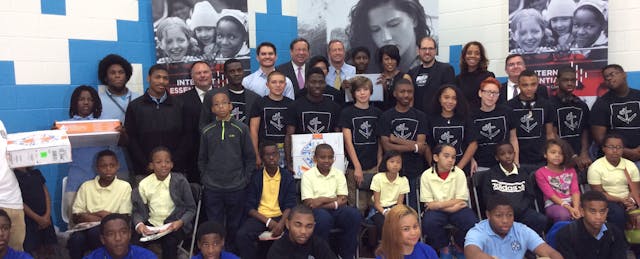An all-star panel of speakers gathered at the Digital Harbor Foundation (DHF) Tech Center in Baltimore on September 22 for Comcast’s announcement of its program expansion to provide low-cost Internet access: Maryland Governor Martin O’Malley, Baltimore Mayor Stephanie Rawlings-Blake, Comcast Executive Vice President David Cohen, Betamore’s CEO Mike Brenner, and some impressive youth.
"To overcome the digital divide, youth need access to both technology and tech education," opened Andrew Coy, executive director of DHF. Comcast is stepping up to help both through its support of DHF programs and its Internet Essentials program.
Comcast’s Internet Essentials program provides low-cost Internet access and devices to low-income families. The program has served over 1.4 million people across the US since its inception in 2011, according to Cohen, including 30,000 Maryland families served last year alone.
New families that apply for service through Internet Essentials by September 30 will receive their first six months free and then broadband service becomes $9.95/month. (Families who live in a Comcast area with at least one child who qualifies for the national school lunch program are eligible.) Most families discover the program through their schools, Girls and Boys Clubs, and other community organizations.
Cohen shared numbers that illustrate the sharp “unjust” contrast between the haves and have-nots: Over 90% of suburban families have broadband access compared to 15 to 25% of lower-income communities. Mayor Rawlings-Blake finds these numbers “unacceptable” and argued that “students who don’t have Internet at home are going to be left behind. Their teachers can’t challenge them in the same ways they can when they know students have regular access.”
Students who attended the DHF event, from Digital Harbor High School, Liberty Elementary School and DHF’s out-of-school programs, now can count on having internet at home. They came away from the event with an unexpected surprise from Comcast: they each received a new laptop and one year’s worth of Internet.
“These kinds of public private partnerships are critical,” shared EdTech Maryland’s Board Chair Jennifer Gunner-Meyer. “When students have access at home as well as at school, they’re more likely to become creators of tech, not just consumers.”
Governor O’Malley also reflected on the change of advice given to young people to secure their prosperity: “In my youth we were told to specialize and differentiate ourselves from the pack. Now youth must become more multidisciplinary in their pursuits and create stronger connections with others.”
Digital Harbor High School senior Nicholas Cato built on O’Malley’s remarks about connections in his own comments: “I want my career to be like this -- where I work towards a common vision with a variety of other people from all different backgrounds.” Cato continued, “I wish school was more like this. People could work together better, find and share interests, and solve real-world problems.”
Cato finished with a recognition that the Internet is ultimately about people: “I believe that access to the Internet is something that everybody should have and should actively use in their day-to-day lives. It’s a life-saver, a game-changer and most importantly, it is us, because without you and me, where would the Internet be?”


